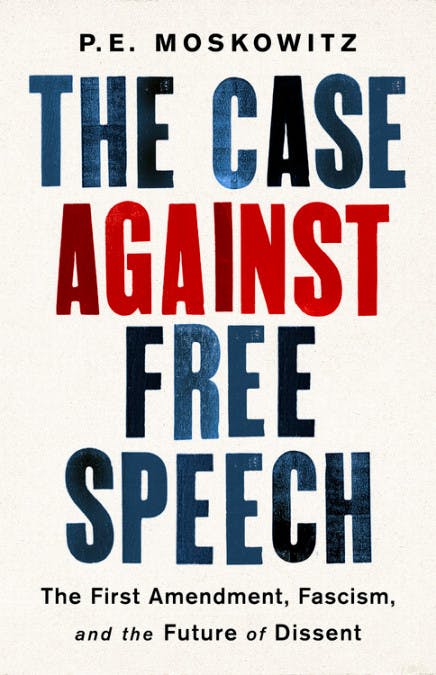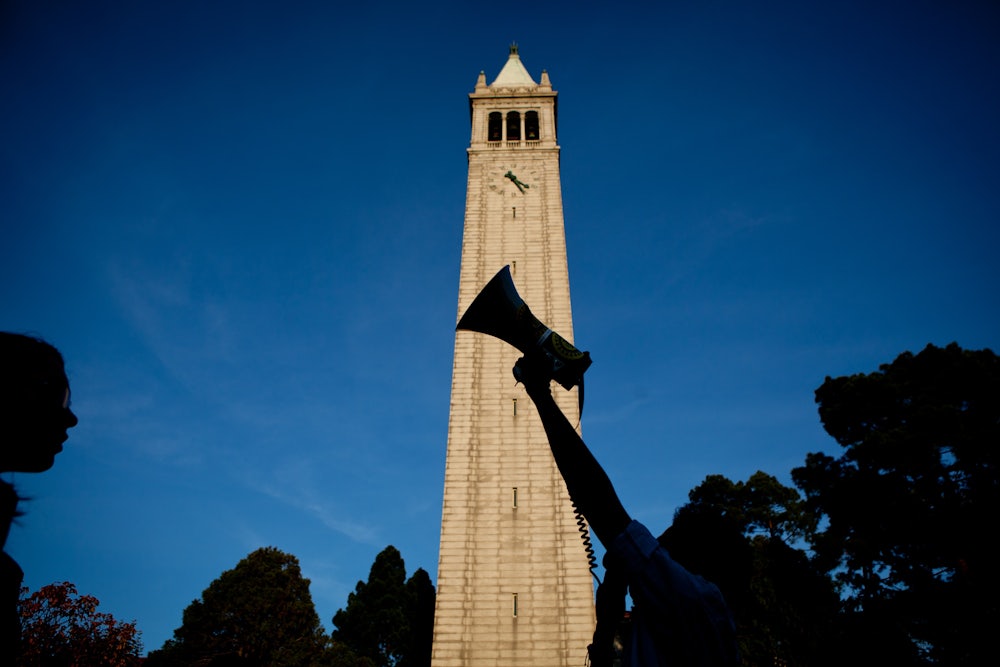What is free speech? The First Amendment to the U.S. Constitution—perhaps the most explicit legal protection of the right to free speech in the entire world—does not say. It simply states that “Congress shall make no law … abridging the freedom of speech, or of the press.” It does not, as the saying goes, define its terms. And just ten years after the ratification of the Constitution and the Bill of Rights, Congress passed “An act for the punishment of certain crimes against the United States,” more commonly known as the Sedition Act of 1798, criminalizing a broad array of speech acts, including almost any criticism of the federal government. This law was, like many bad laws in American history, an act of anticipatory war fever—the government at the time was preparing for a potential war with France.

The Sedition Act of 1798 was allowed to expire after the election of Thomas Jefferson, but over subsequent decades and centuries, the United States repeatedly criminalized speech and engaged in censorship, targeting radicals and abolitionists, communists and anarchists, civil rights activists and supposed pornographers. For the entire history of the United States, free speech has remained hotly contested and hazily defined, often subject to the pithy (and useless) rubric that Supreme Court Justice Potter Stewart espoused for identifying “hard-core pornography” in 1964: “I’ll know it when I see it.”
“How, then, did something with such murky, morally conflictual beginnings become viewed as an inherent good, something we should strive for not only legally, but in every interaction, every protest?” P.E. Moskowitz asks in their new book, The Case Against Free Speech. How did a limited right—understood for most of its history to belong narrowly to a select group of people, subject to all sorts of constraints, both legal and social—evolve into its broad modern conception, in which the right to receive a polite reception for a well-paid speech on a university campus and the right to advocate explicitly for genocide are as sacrosanct as every other human right; where they represent, in fact, the singular and semidivine right from which all other rights and freedoms flow?
Moskowitz is a writer and activist currently based in New Orleans. Their first book, How to Kill a City, published in 2017, had the unique qualities of being both utterly charming and deeply dispiriting, as it traced in block-by-block—sometimes building-by-building—detail the transformation of three American cities from genuine sites of human habitation into increasingly empty and homogenous vehicles for global capital. There is high-level commentary on finance and politics, but the narrative unfolds on a very human scale. The New York section, structured as a walking tour across the long-since subsumed and gentrified New York (mostly lower Manhattan) where Moskowitz grew up, is at once angry and elegiac. I read it over a single night, sitting at a gate in Washington Dulles and then on a flight across the Atlantic.
Moskowitz uses a similar method in The Case Against Free Speech, alternating between historical overview and more intimate and personal reporting. The book’s central argument is straightforward: that while defenders of free speech say that it is necessary to protect the voices and political rights of ordinary citizens from the oppressive power of governments, in reality the speech rights of minorities, leftists, and marginalized people have been abrogated any time they threaten the interests of the state or the institutions of capitalism, whereas these same flimsy principles become rigid and absolute when it comes to protecting the freedom of the political right to advocate violence and ethnic cleansing—and, indeed, that the right invokes the principle of free speech not only to protect advocacy for violence, but has subtly elided “mere” advocacy with actual, physical violence.
Moskowitz was present for the far-right riots in Charlottesville, Virginia—billed, of course, as protests for “free speech”—that ended with one of the rioters driving a speeding car into a crowd of counter-protesters, injuring dozens and murdering local activist Heather Heyer, to whom Moskowitz’s book is dedicated. Moskowitz was in the crowd at the time and writes of suffering from severe anxiety and PTSD over the following year. They speak to students and fellow activists, including, in one chapter, a fascinating discussion with an antifa activist who talks in some detail about the laborious and diligent research and outreach antifa attempts in order to avoid physical confrontations with conservative provocateurs.
The reportage is more engrossing than the history, which can occasionally shade into a kind of term-paper gloss on complex events and politics. A history of the ACLU’s transformation from a radical labor organization that viewed equality of material conditions as a necessary precondition to any universal right of expression into a bastion of “milquetoast progressivism” is a captivating and well-told piece of context. The sections on the Berkeley-led campus free speech movement are less so, and I would have liked to see a deeper engagement with the way the radical individualism of 1960s counterculture moved leftism away from a more collectivist and labor-oriented outlook. (The antics of “alt-right” figures like campus barnstormer Milo Yiannopoulos or white nationalist media personality Richard Spencer are self-consciously derived from ’60s individualistic radicalism, with its penchant for shocking the squares, for épater le bourgeois.)
This hurried campus history is a disappointment, because unlike most of the mainstream press, Moskowitz treats the concerns of students and young people seriously. Their approach is a refreshing contrast with well-heeled newspaper columnists and magazine opinion writers, who have found it easy to characterize college students as privileged, fragile “snowflakes” unable to cope with the hurly-burly of rigorous, free-wheeling debate; similarly, the book refuses to equate students’ attempts to “deplatform” conservative speakers—by heckling, demonstrating, or disinviting them—with the right’s bloody enthusiasms in Charlottesville. Moskowitz is obviously sympathetic to the students’ cause, but gives student activists and leaders their own space to explain how, for example, they arrive at a decision to try to deplatform a speaker. The activists come off as thoughtful and cautious, not inherently opposed to other viewpoints, but insistent on one point: that institutions have power, and that by hosting a speaker who advocates for scientific racism or ethnic cleansing, those institutions lend their prestige and their power to those ideas. Well, is it so much to ask that the place I call both home and work not open its doors to men who say that I should, quite literally, die?
The Case Against Free Speech is not really an argument against free speech, but an argument against the concept of free speech itself. Free speech, Moskowitz proposes, is a term that refers to no single political object and has no common meaning; it is malleable and ductile, shaped by use and context, but ultimately empty. The entire debate, then, is a clever misdirection of an argument that is far more basically about power: Who has it, and who has access to it? Free speech, in other words, is not a precondition of political freedom, but a result. And freedom, as the right likes to remind us, is very rarely free. Speech has a price.
How convincing is Moskowitz’s case? I have always considered myself very nearly an absolutist as regards free speech, ironically for reasons that Moskowitz ably identifies in a book arguing that free speech is a bogus category. The power of governments and other powerful interests to censor and suppress the speech of disfavored groups is already so great that it would be foolish to arrogate to such interests even greater powers to control the speech and expression of citizens. Such powers would only ever be turned against minorities and activists, leftists and anticapitalists, protestors against wars and the militarization of law enforcement. Does the government already practice all kinds of censorship where the left is concerned? Yes. Do corporations utilize their control of airwaves and internet service providers, of publishing and online platforms, to favor certain messages and bury others? Yes, yes. Why would we hand them more power?
But I am also perhaps primed as a ready audience for Moskowitz, because I have become increasingly convinced that these arguments are woefully inadequate. In the first place, they seem to me to make a dangerous and fundamental concession: that state power is inherently right-wing; that the tools of government can only ever belong to a conservative tendency; that the left can never attain and never wield political power, and so its only choice is to hope for almost libertarian limits on a power that will inevitably and inexorably be turned against the left. Well, if that is the case, we might as well pack it in right now and go home. If the project of the political left is not to gain and use political power to build a better world, then it is nothing more than an affect, precisely the project of personal vanity that the “anti-P.C.” right routinely accuses it of being.
And while I am less sympathetic than Moskowitz to campus deplatforming at elite universities and liberal arts institutions, because—as a product of one myself—I cannot help but find the pretensions of student activists in these privileged enclaves to a shared subaltern status with America’s poor and oppressed to be weirdly self-congratulatory, I am also increasingly convinced that both student activists and the newspaper columnists who despise them are right to identify campuses as vanguards of contested space, precisely because they function, in Moskowitz’s formulation, as microcosms of the broader society and testing grounds for social change. The Case Against Free Speech does these students a good service by taking their complaints—and their deliberations—as seriously as it does, because it demonstrates that many of them have arrived at one central, penetrating observation: Campuses are critical not because they are where the population is the most oppressed and most vulnerable; campuses are critical because they are where dangerous, racist, even genocidal ideas go to be washed clean. They provide an imprimatur of respectability. There is a reason why reactionary conservatives, their interlocutors in the legacy media, and the billionaire backers of both, are so eager to get into colleges in the first place.
The Case Against Free Speech is a sometimes flawed but necessary book, one that I hope people will read and argue with, and one that I hope spawns both some more rigorous histories of political conceptions of speech as well as some more pointed polemics aiming at the sacrosanctity of the First Amendment, which could stand to be a site of contestation rather than blindly awed reverence.
“America,” Moskowitz writes, “has a way of forgetting.” We remember that Joseph McCarthy got his ass handed to him at the Army-McCarthy hearings, but forget that he was just one avatar of a vicious history of anti-left suppression that preceded him and continued long after he left power. We remember Martin Luther King, Jr. as a great national hero and great orator and forget that the FBI and U.S. government hounded him throughout his life and considered him a traitor and agitator (as did much of the American population, by the way). We remember that the ACLU successfully defended the right of Nazis to march in Skokie, Illinois in 1978, but not that threats of violent opposition from the Jewish Defense League ultimately dissuaded them from doing so. We are already more inclined to remember what the President stupidly said about Charlottesville than what really happened there.
By placing “free speech” in quotation marks and arguing that it is really a floating signifier, a stand-in for a very different argument about who controls and who can access the public square and the spheres of political power in America, Moskowitz has posed a pretty vital question: How can you speak freely when you don’t know what you’re talking about in the first place?
